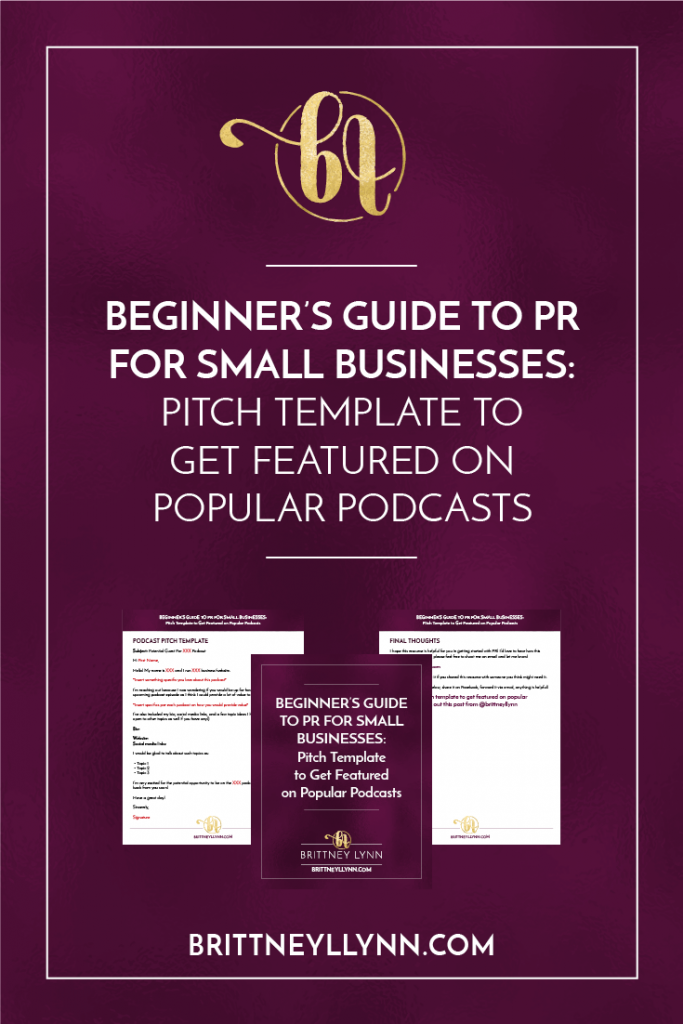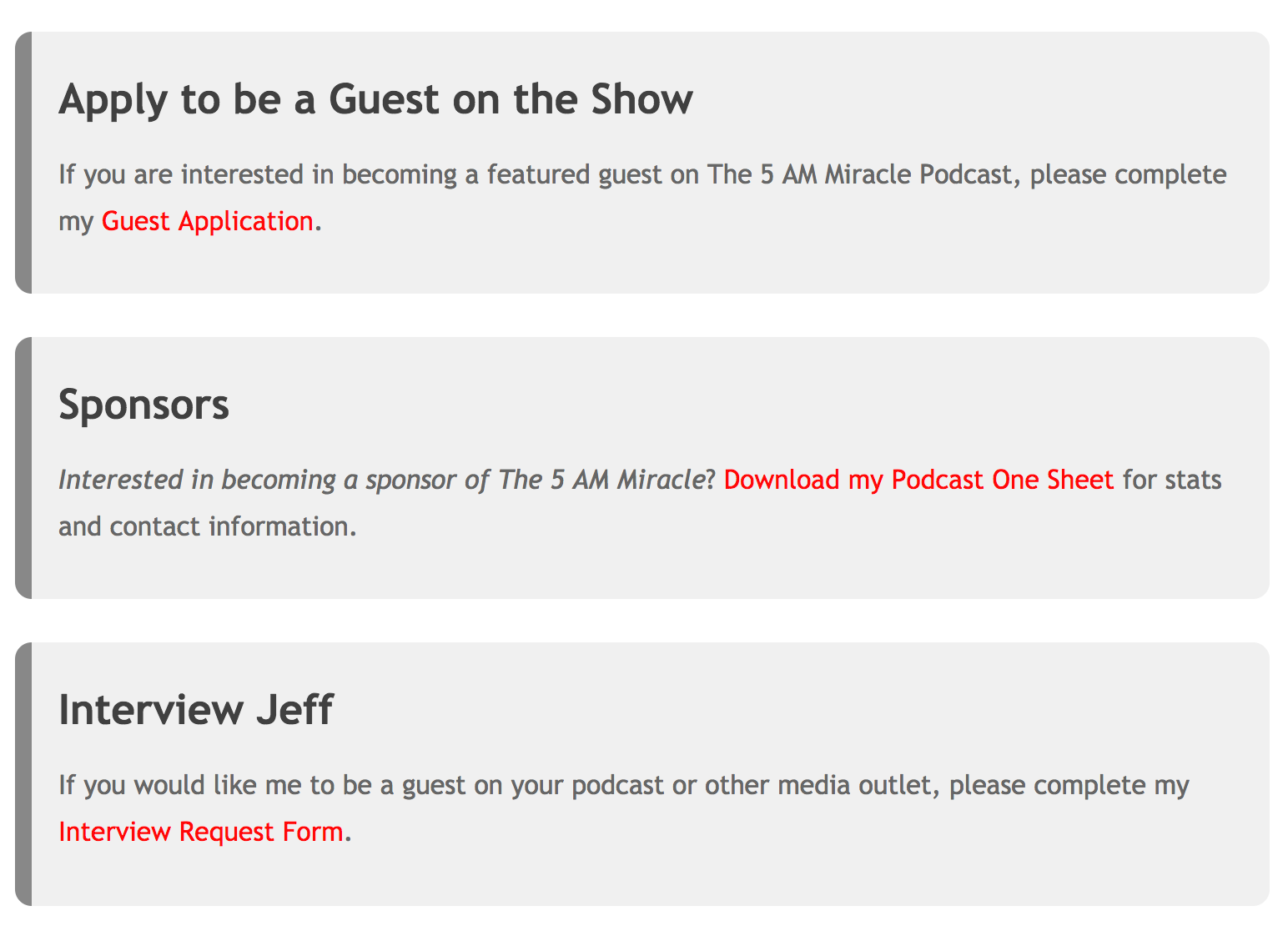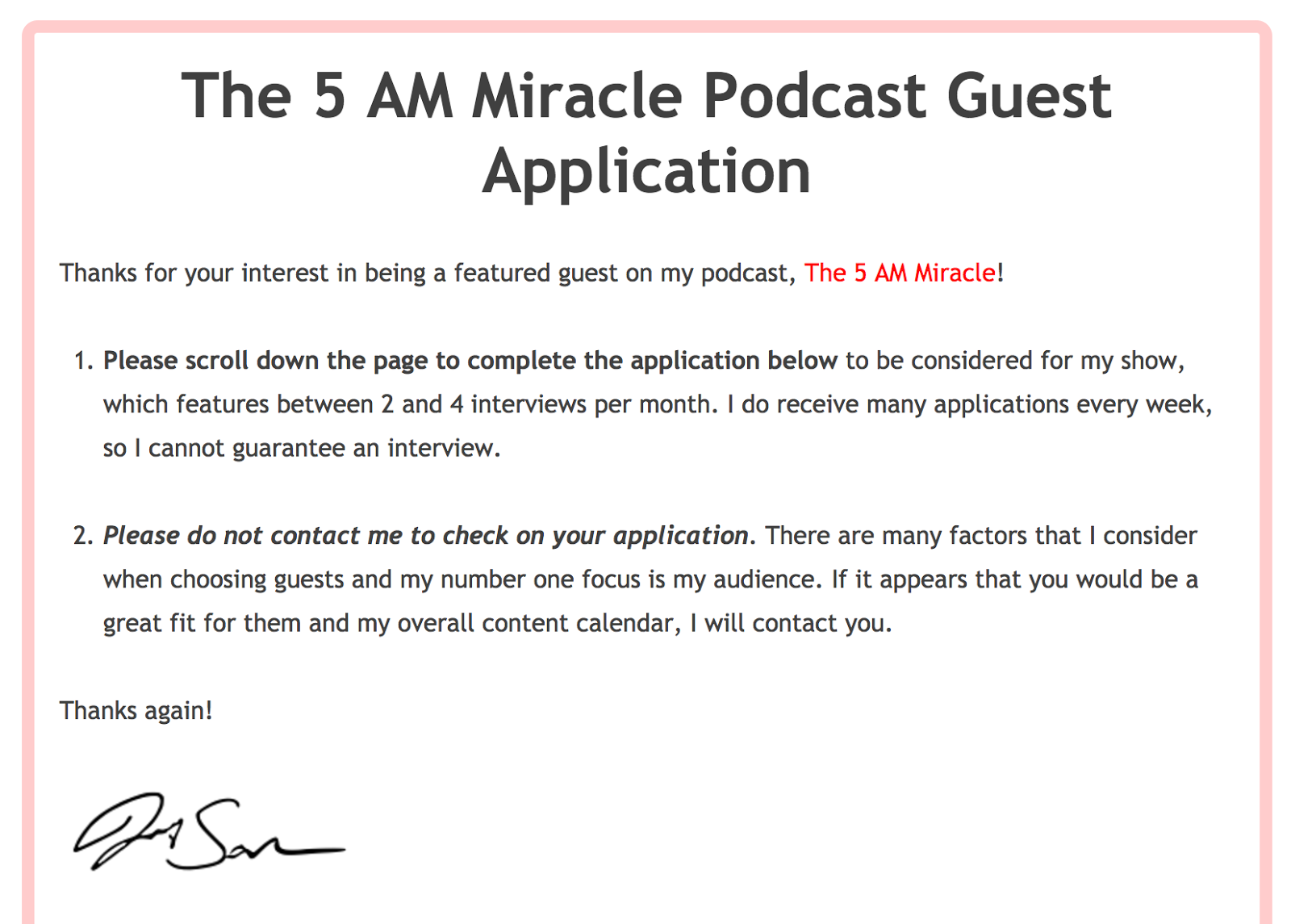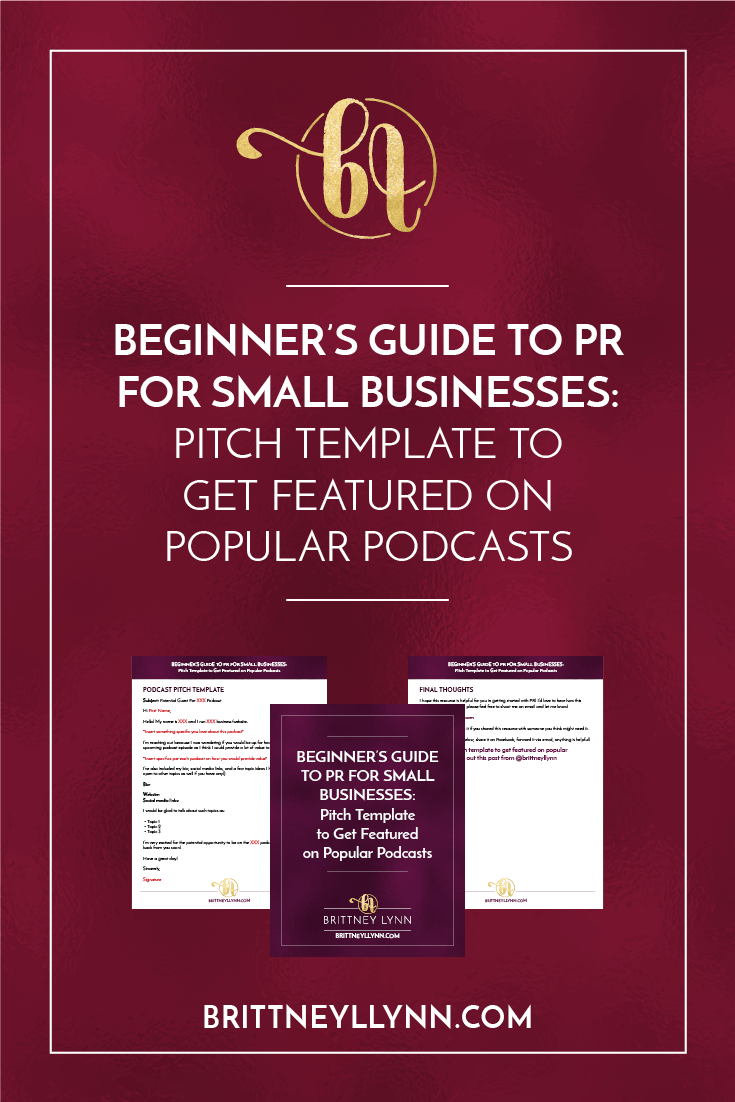Beginner's Guide To Using PR For Your Small Business: Get Featured On Popular Websites and Podcasts
 Welcome back to my beginner’s guide to PR series! If you’re just joining us around here, I’m doing a 3-part blog post series all on how small businesses can begin to use PR for their business. Today, I'm going to share how you can get featured on popular websites and podcasts.Here’s what I've covered so far in the series:
Welcome back to my beginner’s guide to PR series! If you’re just joining us around here, I’m doing a 3-part blog post series all on how small businesses can begin to use PR for their business. Today, I'm going to share how you can get featured on popular websites and podcasts.Here’s what I've covered so far in the series:
- Why PR is Important & How To Start Using It
- How To Authentically Connect With Media & Influencers
- How To Get Featured On Popular Websites & Podcasts (this post!)
Getting featured on popular websites and podcasts can absolutely catapult your business.
Why should you want to get featured on popular websites and podcasts? Here are just a few reasons:
- Traffic growth: Having popular websites and podcasts feature you will get your brand and business out there on the web. Having these links back to your site will provide you with more traffic and better SEO.
- Audience growth: Naturally as your traffic increases, so should your audience. Having more people visit your site will increase your email subscribers and social media followers.
- Be seen as a trusted expert: Getting the "stamp of approval" from these popular websites and podcasts will elevate you as a trusted source for your industry. People prefer buying from a trusted expert as opposed to someone completely random.
- Faster growth: Getting hits from popular websites and podcasts can grow your business a lot faster than if you have no press at all. It's a lot harder to stand out online these days, so getting help from sites that already have a large following can help you grow faster.
- People get to know you better: This one is especially for podcast features. When you hear someone's voice, you automatically feel more connected with them than if you read an article about them. Shortening the time it takes to let your audience get to know you can shorten the buying process too.
After reading this post, you'll have a clear idea how you can start approaching popular websites and podcasts. Don't forget to download the free podcast pitch template!
Beginner's Guide To Using PR For Your Small Business: How To Get Featured On Popular Websites and Podcasts
Identify 6-8 topics you can speak on
Before we get to pitching, we need to do a little exercise. And this exercise is the most important, so don’t skip it!In the first post of the series, we briefly talked about coming up with topics you could pitch. If you didn’t already do that exercise, we’re going to do it now.Whatever industry you’re in, whether you run an online shop selling knitting supplies or you’re an author that writes about golf, there are certain topics that you can easily write about or discuss on a podcast.Need help figuring out exactly what topics you can talk about? Here are some questions to answer to help you gain clarity:
- What is it that you want to be known for?
- What is your business already known for?
- What industry do you have experience in?
- What do your friends and family ask you questions about constantly?
- What do you enjoy talking about for hours on end?
Now once you have your topics, write a brief paragraph on each. 4-6 sentences are plenty.
Related post: Beginner’s Guide To PR For Small Businesses: Why It’s Important & How To Start
Identify relevant platforms
Now let’s get to the good stuff, finding those sites & podcasts that you can get featured on!While many have the dream of being featured on ginormous sites like Huffington Post and Entrepreneur, we should also identify niche specific sites.As they say, the riches are in the niches. This is especially important if you're just starting out, as you will have a harder time getting onto major websites in the beginning.Here are some tips on finding relevant sites for whatever business you’re in:
- What sites does your ideal audience read? One of my clients is an online life coach for women in their 20s. While it’d be awesome to get her featured on Fast Company, it’s not our primary goal because her audience isn’t there. They follow brands such as Cosmo, The Every Girl, or Advice From A Twenty Something, so those are places we're focusing on targeting.
- What media does your ideal audience follow online? You can start to get an idea by looking at who people follow on Instagram or Facebook. When I start with a new PR client, I pick out a site their ideal audience would follow (let's say The Every Girl for example), and then I look at the related profiles on Instagram.
- What books does your ideal audience read? Amazon is an amazing resource to conduct research. Keeping with the life coach client example, her audience would love reading Jen Sincero's books. I'd go to Amazon, look at her book, and then look at the related books that pop up. Now we have an entire list of authors we could potentially work with, guest blog for, or collaborate with. You can also use this as a way to search for places the author has been interviewed to get ideas of places we could pitch my client.
Here are additional tips on finding relevant podcasts:
- What podcasts does your ideal audience listen to? If you already have an audience (even a small one!) ask them! If not, you can search in relevant Facebook groups to see what podcasts people recommend or simply Google "'your industry' podcasts."
- What podcasts would introduce you to a new, yet related audience? This is where my Amazon tip above could come into play. You could get a lot of ideas from people that are in your same industry and where they've already been interviewed.
- What podcasts are related to ones your audience already follows? The iTunes search is another amazing resource to find relevant podcasts. I've found that their related suggestions are mostly on point.
Know the right person to contact
Knowing the right person to contact can make or break getting a feature on a popular site or a podcast. Below are my tips for finding exactly the right person.
- Tips on finding the right person to pitch for a podcast interview: Some podcast websites will list exactly what it is you need to do to pitch a potential guest. Here’s an example from the 5 AM Miracle podcast:
 As you can see, he has an application for potential guests to fill out.
As you can see, he has an application for potential guests to fill out. For this particular podcast, I would not try and email him because he clearly states this is how he would like potential guests to be submitted.Other sites don’t list any application process, so for those, I find their email address (or at worst their contact page) and submit that way.Preferably you find an email address, but some people don’t list their email addresses on their site.Tips on finding the right person to pitch for a popular website:This can vary greatly, as each website has its own process for selecting people to interview, people to write a feature article or people to mention within an article. Here are my general tips:
For this particular podcast, I would not try and email him because he clearly states this is how he would like potential guests to be submitted.Other sites don’t list any application process, so for those, I find their email address (or at worst their contact page) and submit that way.Preferably you find an email address, but some people don’t list their email addresses on their site.Tips on finding the right person to pitch for a popular website:This can vary greatly, as each website has its own process for selecting people to interview, people to write a feature article or people to mention within an article. Here are my general tips:
- First, if they are a huge website (Huffington Post for example), I’d search “pitching to Huffington Post.” With a big site like that, you’re bound to find articles that have been written how people got featured on their site. This can go for pitching to large magazines too.
- For smaller sites (Modern Mom for example), I'd search "write for us Modern Mom" or "contributors Modern Mom" to find potential opportunities to write for them.
Pitch at the right time
If you’re just starting your business (aka you have almost no content on your site and haven’t sold a thing), you probably aren't going to get accepted onto high-profile podcasts & websites. The key to get featured on popular websites and podcasts is to start small and work your way up.How can you tell if a podcast has a smaller following? Well, for one, you should have at least listened to a few episodes of the potential podcasts you’re pitching. Once listening you can have an idea of how large they are.Another way of telling is how many reviews they have on iTunes. Podcasts with hundreds of reviews are probably pretty popular.Times to not pitch:
- You’re in the middle of doing a re-brand
- You’re changing your services/products
- You just started your business (0-6 months in)
- You don’t have the time
Times to pitch:
- When you have your 6-8 topics outlined
- When you have something to promote (But do NOT go into only thinking of promoting your product or service. You need to give the audience value first.)
- When you have done your research into relevant websites and podcasts to pitch
- When your website is prepared for the potential increase in traffic.
[bctt tweet="Want a free pitch template to get featured on popular podcasts? Check out this post from @brittneyllynn!" via="no"]
Write a unique pitch to each place you contact
THIS IS VERY IMPORTANT. Nobody wants to read a boring, irrelevant pitch email. And if you're pitching major websites and podcasts, they especially don't want to see a boring pitch email because they receive a ton of emails every day.
Writing a unique pitch will help you stand out from the rest of the boring emails in their inbox.
But! With that said, there are a few things you will want to include in every email, so you should using a pitch template to save time.What are the elements of a great pitch?
- Quick description explaining why you'd be a great guest on their site/podcast (remember, you're selling yourself, so work it!)
- Bio including any other places you've been featured
- Something specific about the place your pitching (a recent article or podcast episode you loved, something you have in common with the person you're reaching out to, anything that shows that this isn't a copy and paste email)
- 4-5 potential topic ideas with descriptions
- Quick closing without a hard sell
Know when to follow up
I don’t follow up with every pitch I send for my clients.Shocker!But it’s the truth.Not every pitch warrants a follow-up, but sometimes me following up is what gets my clients onto a podcast or a website, so it is important.When to follow up:
- You contacted them via email, you haven't heard back and it's been about 10-14 days since you pitched.
- They responded yes, but you haven't heard back anything in 10-14 days since.
When to not follow up:
- You filled out a contact form.
- You get an out of office response that they're on vacation. Give them time to get back into work once they're back.
- Their site specifically states to not follow up.
Related post: Beginner’s Guide To PR For Small Businesses: How To Authentically Connect With Media & Influencers
If you get a yes...here’s what to do!
Share the heck out of itWould you believe that sometimes people get featured on popular websites and podcasts….and they don’t share it with their audience?It’s true, I swear! My friend Jess has a podcast and she realized half of her guests did not share when they were on her podcast. Uh, what? That's whack!Getting featured and then not sharing it is like getting a box of chocolates to share and then you eat all of them yourself. No fun!As they say, sharing is caring. Your audience wants to know of places you’re mentioned because, hello they love you!The podcast or website you’ve been featured on also will appreciate you sharing it because it’s a two-way street.
And if you get a no…here’s what to do.
Know that it sometimes takes timeWhen you first start pitching yourself, it can be super intimidating. You might have imposter syndrome feelings, such as:“Who am I to pitch this huge website or podcast?”“They’ll never pick me. Why would anyone want to feature me?”“I don’t have any value to add.”You need to stop these thoughts and get out of your own head. You must put yourself out there to get featured on a popular website or podcast.Will you be turned down? YesWill you be turned down by everyone? Most likely no, unless you’re being unrealistic with who you first pitch.It’s unlikely that you’ll get all of the features you pitch, but that’s part of the process.You definitely won’t get a feature without trying, so what’s the harm?Here are a few more tips to keep in mind:
- Sometimes no means no, but sometimes it means something else. Like, no, not right now or no, not this but maybe something else. I’ve pitched clients for podcasts that they didn’t get on but were asked to speak at a conference instead. Is that still a win in my book? Heck yes!
- Don’t take it personally. I understand the initial pang of disappointment that can happen when you get turned down, but as time goes on it will get easier. Don’t take offense to them saying no, it just wasn’t meant to be at this point in time. It doesn’t mean you and what you have to offer isn’t valuable, it just means it wasn’t right for them.
- Be kind. The worst thing you can do after getting a no is to start ranting about why you should be featured and having a chip on your shoulder. Every podcast and media platform has their own values, mission, and purpose and perhaps at this moment what you pitched doesn’t fit into that. Be gracious and move on.
- Keep trying. I lied in my statement above. The worst thing you can actually do is to stop trying.
Final thoughts on how to get featured on popular websites and podcasts
I think this is my longest post yet! There's nothing I could leave out though. It's all important!You should now feel confident in pitching popular websites and podcasts and that you're prepared to start putting yourself out there.Don't forget to check out my other two posts in the series and grab your free pitch template!Why PR is Important & How To Start Using ItHow To Authentically Connect With Media & Influencers



